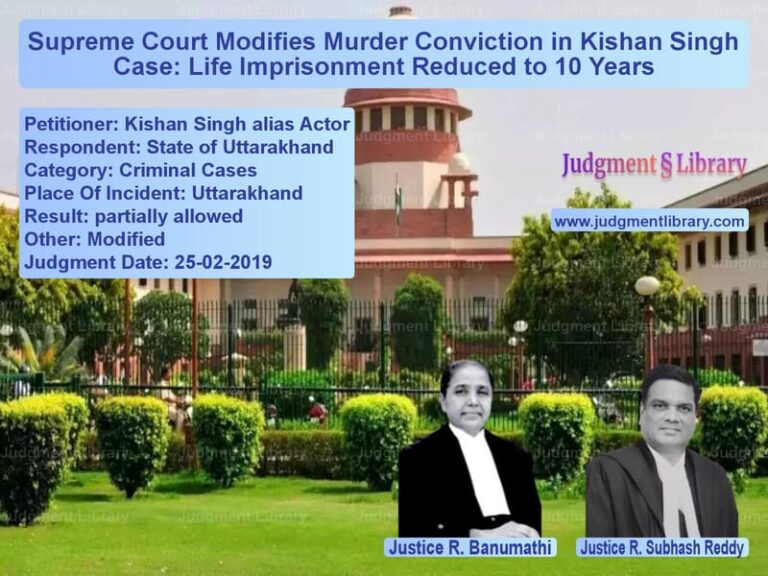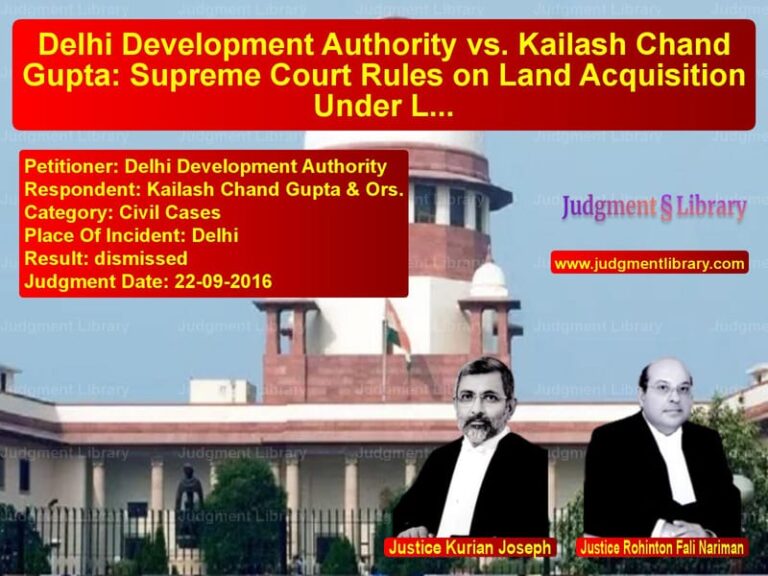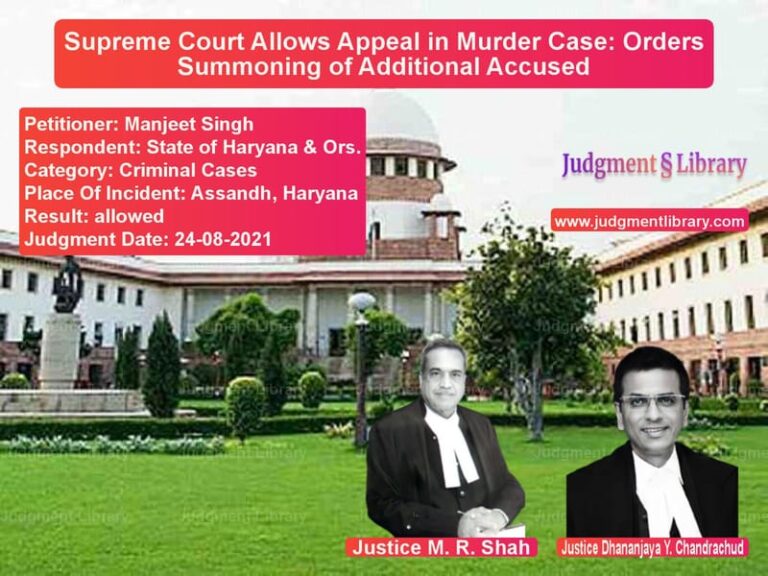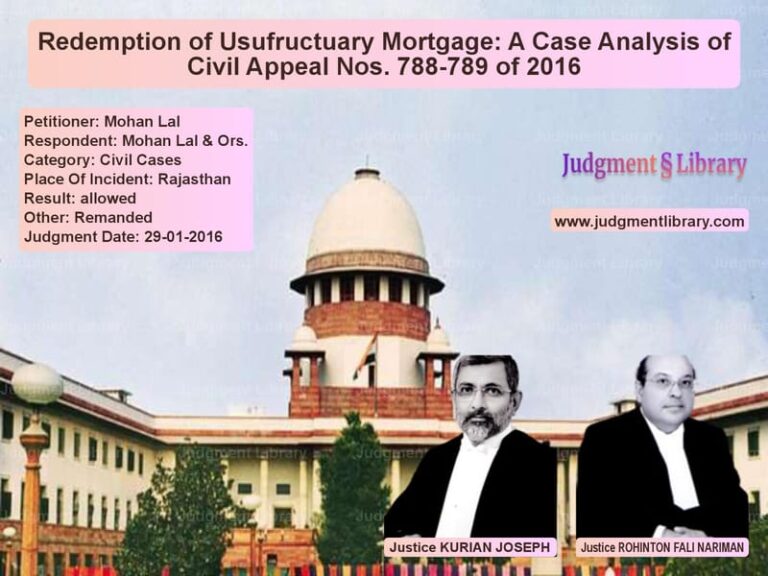Specific Performance Case: Supreme Court Remands Appeal for Proper Legal Examination
The Supreme Court of India recently set aside a Bombay High Court ruling in a specific performance case and remanded the matter for proper adjudication. The case, Shri Rajendra Lalitkumar Agrawal vs. Smt. Ratna Ashok Muranjan & Anr., dealt with a dispute over the enforcement of a contract for sale of property. The Supreme Court ruled that the High Court failed to frame proper substantial questions of law as required under Section 100 of the Civil Procedure Code (CPC) before dismissing the appeal.
Background of the Case
The case arose from a civil suit for specific performance of a contract dated August 8, 1984, filed by the appellant, Rajendra Lalitkumar Agrawal, against the respondents. The appellant claimed that the respondents had entered into an agreement to sell a property but later refused to honor the contract.
The matter was initially heard by the Trial Court, which ruled in favor of the appellant and passed a decree for specific performance on July 5, 2004. The respondents challenged this ruling before the District Judge, Pune, who reversed the decision on November 10, 2016, dismissing the suit.
Aggrieved by the reversal, the appellant filed a second appeal before the Bombay High Court. However, the High Court dismissed the appeal on August 6, 2018, stating that it did not involve any substantial question of law.
Key Legal Issue
The primary question before the Supreme Court was whether the Bombay High Court was justified in dismissing the second appeal without framing and examining substantial questions of law, as mandated under Section 100 CPC.
Petitioner’s Arguments
- The High Court failed to frame substantial questions of law before deciding the appeal.
- The interpretation of the agreement dated August 8, 1984 raised legal issues requiring judicial examination.
- The High Court incorrectly treated the appeal as a first appeal and evaluated the evidence without following proper legal procedures.
- Sections 3, 5, and 15 of the contract contained clauses crucial to determining rights and obligations, which were ignored.
Respondents’ Arguments
- The District Court had already ruled against specific performance, and the High Court merely upheld its ruling.
- The findings of the lower courts did not warrant interference.
- The appellant failed to demonstrate any errors in the High Court’s ruling.
Supreme Court’s Observations
The Supreme Court, comprising Justice Abhay Manohar Sapre and Justice Dinesh Maheshwari, examined the case and ruled:
“The High Court was not right in holding that the appeal does not involve any substantial question of law within the meaning of Section 100 CPC.”
The Court further elaborated:
“The appeal did involve substantial questions of law and should have been framed at the time of admission as provided under Section 100(4) of the Code.”
The Bench emphasized that interpretation of a contract constitutes a substantial question of law:
“The interpretation of any terms and conditions of a document constitutes a substantial question of law, especially when both parties admit the existence of the document.”
Final Verdict
The Supreme Court set aside the High Court’s ruling and remanded the matter for fresh adjudication:
“The case is remanded to the High Court with a request to admit the appeal, frame appropriate substantial questions of law under Section 100(4) CPC, and decide the second appeal on merits.”
The High Court was directed to frame substantial legal questions regarding:
- The rights and obligations under the agreement dated August 8, 1984.
- Whether the appellant fulfilled conditions under Section 16 of the Specific Relief Act for enforcing specific performance.
- Reversal of findings by the lower courts.
Legal and Social Impact
- The ruling reinforces that second appeals must be decided based on substantial questions of law and not treated as first appeals.
- It underscores the importance of proper judicial review in contract enforcement cases.
- The case serves as a precedent for how courts should handle specific performance suits and ensure fair application of legal principles.
The Supreme Court’s decision ensures that the appellant gets a fair opportunity for proper legal scrutiny of his case.
Petitioner Name: Shri Rajendra Lalitkumar Agrawal.Respondent Name: Smt. Ratna Ashok Muranjan & Anr..Judgment By: Justice Abhay Manohar Sapre, Justice Dinesh Maheshwari.Place Of Incident: Pune, Maharashtra.Judgment Date: 31-01-2019.
Don’t miss out on the full details! Download the complete judgment in PDF format below and gain valuable insights instantly!
Download Judgment: Shri Rajendra Lalitk vs Smt. Ratna Ashok Mur Supreme Court of India Judgment Dated 31-01-2019.pdf
Direct Downlaod Judgment: Direct downlaod this Judgment
See all petitions in Specific Performance
See all petitions in Contract Disputes
See all petitions in Property Disputes
See all petitions in Judgment by Abhay Manohar Sapre
See all petitions in Judgment by Dinesh Maheshwari
See all petitions in allowed
See all petitions in Remanded
See all petitions in supreme court of India judgments January 2019
See all petitions in 2019 judgments
See all posts in Civil Cases Category
See all allowed petitions in Civil Cases Category
See all Dismissed petitions in Civil Cases Category
See all partially allowed petitions in Civil Cases Category







